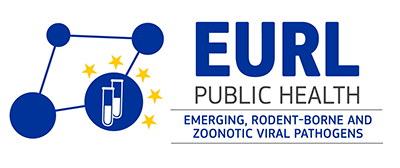About
The EU Reference Laboratory for Public Health on Emerging, Rodent-borne, and Zoonotic Viral Pathogens (EURL-PH-ERZV) plays a key role in supporting public health preparedness across the European Union. This EU-funded project, designated by the European Commission, is part of a broader EU initiative to strengthen laboratory-based responses to serious cross-border health threats.

Coordinated by the Public Health Agency of Sweden, the EURL-PH-ERZV operates through a consortium of institutions, including the National Institute for Infectious Diseases (Italy), Institut Pasteur (France), and the National Center for Public Health and Pharmacy (Hungary). Together, providing targeted support to National Reference Laboratories (NRLs), the European Centre for Disease Prevention and Control (ECDC), and other EU stakeholders.
The EURL-PH-ERZV consortium provides scientific and technical expertise on high-risk viral pathogens of public health concern, including poxviruses, arenaviruses, hantaviruses, filoviruses, henipaviruses, lyssaviruses, and novel emerging viruses such as disease X. These pathogens pose significant challenges for diagnostics, surveillance, and outbreak management.
EURL-PH-ERZV supports standardisation, quality, and preparedness within the laboratory system. Activities include developing and sharing harmonised diagnostic methods, offering training programmes, organising twinning visits, supporting coordinated laboratory surveillance, and contributing to the interpretation of results in line with EU laboratory case definitions. The EURL-PH-ERZV also assists with surge diagnostic capacity during outbreaks, and aims to improve consistency and collaboration across public health laboratories in the EU.
Objectives
The key activites of EURL-PH-ERZV are to:
- Provide reference diagnostics, protocols, expert input, and reference materials to support EU laboratory case definitions.
- Offer specialised testing and supporting enhanced diagnostic capacity during periods of increased demand.
- Strengthen capacity within national reference laboratories through training and External Quality Assessments (EQAs) tailored to identified needs.
- Share expert knowledge on relevant virus groups and pathogens to support accurate diagnostics and surveillance.
- Contribute to early warning systems through laboratory-based monitoring and alert mechanisms.
- Organise meetings and networks to foster collaboration, knowledge exchange, and alignment across laboratories.
- Coordinate with related EU laboratories, projects, and public health initiatives to ensure harmonised approaches.
Through these activities, EURL-PH-ERZV contributes to a resilient European public health laboratory network capable of early detection, rapid response, and containment of viral threats.